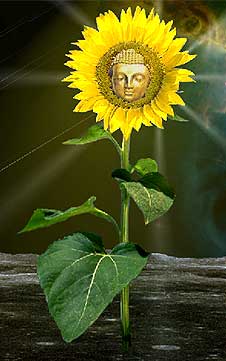Compassion is for the birds, U.S. Buddhist group preaches
By Karin Zeitvogel, Agence France-Presse, Jan 7, 2009
Washington, USA -- As people around the world resolved to be more thoughtful and caring in the new year, a group of Buddhists in the United States is preaching that compassion is for the birds.

At a Tibetan Buddhist temple in this rural suburb of Washington, 35-year-old Christopher Zeoli has for 10 years been playing big brother - or alpha bird, as he puts it - to a steadily growing number of birds with behavioural problems ranging from aggressiveness to self-mutilation.
One of the birds, a huge red macaw, once carved a gash in a monk's shaven head with its talons.
Another wears a protective plastic collar to keep it from pecking itself to death.
The birds, some of which were rescued from abusive owners such as an alcoholic who threw his cockatoo against the wall because it screeched too much, have found a degree of peace at the Garuda Aviary, founded by Zeoli's mother Alyce, a native of Brooklyn who in 1988 became the first western woman to be recognized as a reincarnate lama in the Tibetan Buddhist tradition.
Alyce, who now goes by the Buddhist name Jetsunma Ahkon Norbu Lhamo, started the aviary inadvertently when she adopted a cockatoo in 1998.
"We first got a friend's problematic bird. It screamed, it plucked its own feathers in such a way that it could have bled to death. These are some of the things that parrot owners have to deal with," said Christopher Zeoli, whose life for the past 10 years has been entirely devoted to the birds.
According to Zeoli and others who work at the aviary, macaws and cockatoos have the intelligence of a five or six-year-old child.
"These birds are incredibly emotional and really intelligent, and they bond with their owners, but a lot of people shut the birds away - in a garage, a closet, a laundry room - or cover them up because that makes it dark, and when it's dark, they're quiet," Claire Waggoner, director of the aviary, explained.
The birds feel separation and loss, and when they are constantly covered up, they develop neurotic behavior.
Behind double-glazed windows, around two dozen macaws and an equal number of white cockatoos with peach colored crowns screeched in a cacophony as their human alpha bird chatted.
"We would encourage, specifically when people consider buying a parrot, that they don't. The vast majority suffer in captivity," said Zeoli.
One of the basic truths of Buddhism is that suffering is part of life, but in western society with all its conveniences and easy remedies, suffering has become almost invisible, Ani Dawa, a Buddhist nun from Switzerland, told AFP.
"In our society, it's difficult to understand what suffering is because we have fairly comfortable lives and we can alleviate suffering easily," she said.
"But the suffering of the birds is so obvious, and just seeing it, you start to understand what suffering means."
Another of the noble truths of Buddhism is that suffering can be alleviated by changing the way we think.
"You might start to look at other parts of the animal world and eventually you might understand that there are humans who are suffering," Dawa said.
Running the aviary costs 45,000 dollars a year, or around 1,000 dollars per bird.
"We would like to raise awareness so that people stop buying parrots," said Zeoli, who sees his job as chief keeper of the hyacinth and red macaws, the white cockatoos and African greys as a lifetime occupation.
Parrots have a life expectancy of around 85 years, and are likely to outlive their human caretakers if they are domesticated.
"Parrots just don't make good pets. They live so long and require so much," Waggoner said.
"We get emails and calls weekly from people who have parrots and can't keep them any more," she said, adding as a final argument to arouse compassion for the birds: "In the wild you don't see feather plucking. In captivity, it happens a lot."

 At a Tibetan Buddhist temple in this rural suburb of Washington, 35-year-old Christopher Zeoli has for 10 years been playing big brother - or alpha bird, as he puts it - to a steadily growing number of birds with behavioural problems ranging from aggressiveness to self-mutilation.
At a Tibetan Buddhist temple in this rural suburb of Washington, 35-year-old Christopher Zeoli has for 10 years been playing big brother - or alpha bird, as he puts it - to a steadily growing number of birds with behavioural problems ranging from aggressiveness to self-mutilation.